11 may 2018
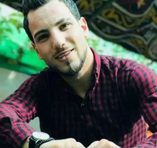
Hani Fayez al-’Adarba, 23
Palestinian medical sources in Hebron, in the southern part of the occupied West Bank, has reported that a young man died, Friday, from serious wounds he suffered on May 9th, after being rammed by an Israeli colony’s bus.
The sources said the Palestinian, Hani Fayez al-’Adarba, 23, was struck by the speeding Israeli bus on settlement road #35, which links to Tarqoumia terminal and road #60, near Halhoul, north of Hebron city.
He suffered various serious fractures and internal injuries, and was moved to an Israeli hospital where he died from his wounds.
Palestinian medical sources in Hebron, in the southern part of the occupied West Bank, has reported that a young man died, Friday, from serious wounds he suffered on May 9th, after being rammed by an Israeli colony’s bus.
The sources said the Palestinian, Hani Fayez al-’Adarba, 23, was struck by the speeding Israeli bus on settlement road #35, which links to Tarqoumia terminal and road #60, near Halhoul, north of Hebron city.
He suffered various serious fractures and internal injuries, and was moved to an Israeli hospital where he died from his wounds.
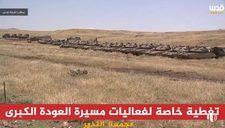
Israeli Tanks Along The Gaza Border
Israeli soldiers shot, Friday, three Palestinians, including a child, just before the weekly Great Return March started in the Gaza Strip.
Medical sources said the soldiers shot a child with two live rounds in his legs, east of Jabalia, in northern Gaza Strip.
They added that the soldiers also shot a young man with live fire, east of Gaza city.
Furthermore, an Israeli army sharpshooter shot a young man, just as he flew balloons carrying the colors of the Palestinian flag, east of the Zeitoun neighborhood, southeast of Gaza city, wounding him in the leg, before he was rushed to the Shifa Medical Center.
Later on, several young men flew burning kites into a military base across the border fence, east of Jabalia, in northern Gaza, causing fires.
In addition, Quds News Network has reported that the soldiers also arrested an Israeli colonialist settler near the border fence after he accidentally caused fire in a field on the Israeli side, while trying to launch a burning kite into Palestinian lands. Video
Israeli soldiers shot, Friday, three Palestinians, including a child, just before the weekly Great Return March started in the Gaza Strip.
Medical sources said the soldiers shot a child with two live rounds in his legs, east of Jabalia, in northern Gaza Strip.
They added that the soldiers also shot a young man with live fire, east of Gaza city.
Furthermore, an Israeli army sharpshooter shot a young man, just as he flew balloons carrying the colors of the Palestinian flag, east of the Zeitoun neighborhood, southeast of Gaza city, wounding him in the leg, before he was rushed to the Shifa Medical Center.
Later on, several young men flew burning kites into a military base across the border fence, east of Jabalia, in northern Gaza, causing fires.
In addition, Quds News Network has reported that the soldiers also arrested an Israeli colonialist settler near the border fence after he accidentally caused fire in a field on the Israeli side, while trying to launch a burning kite into Palestinian lands. Video
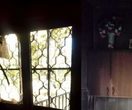
A group of fanatic illegal Israeli colonizers hurled, on Friday at dawn, fire bombs at a home of the Dawabsha family in Douma village, south of the northern West Bank city of Nablus.
Media sources in Nablus said the Israeli assailants hurled many firebombs into the home of Yasser Ahmad Dawabsha, as he and his family were sleeping.
They also caused damaged to the iron bars on the windows of the house and fled the scene.
The family, and neighbors rushed to extinguish the fire before Palestinian firefighters arrived at the scene and safely extinguished it.
Although the attack led to excessive property damage, the family managed to escape physically unharmed.
It is worth mentioning that on July 30th 2015, a group of terrorist Israeli colonizers hurled firebombs into the home of Sa’ad Dawabsha, 32, in a similar dawn attack, leading to his death along with his wife Reham, 27, and their 18-month-old Ali. The only survivor was their son Ahmad, 5.
Media sources in Nablus said the Israeli assailants hurled many firebombs into the home of Yasser Ahmad Dawabsha, as he and his family were sleeping.
They also caused damaged to the iron bars on the windows of the house and fled the scene.
The family, and neighbors rushed to extinguish the fire before Palestinian firefighters arrived at the scene and safely extinguished it.
Although the attack led to excessive property damage, the family managed to escape physically unharmed.
It is worth mentioning that on July 30th 2015, a group of terrorist Israeli colonizers hurled firebombs into the home of Sa’ad Dawabsha, 32, in a similar dawn attack, leading to his death along with his wife Reham, 27, and their 18-month-old Ali. The only survivor was their son Ahmad, 5.
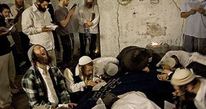
Israeli soldiers injured, on Friday at dawn, 61 Palestinians, including two with live fire, in the northern West Bank city of Nablus.
Medical sources said the soldiers shot two young men with live fire, fourteen with rubber-coated steel bullets and caused 45 others to suffer the effects of teargas inhalation.
The attack came after dozens of Palestinians protested in the city when many army jeeps and buses loaded with colonialist settlers invaded the city and headed towards “Joseph’s Tomb.”
The soldiers resorted to the excessive use of force against the protesters, and fire live rounds, rubber-coated steel bullets, gas bombs and concussion grenades.
The site of Joseph’s Tomb is contentious; Palestinians believe the site to be the funerary monument to Sheikh Yousef Dweikat, a local religious figure, while Israeli settlers believe it to belong to the biblical patriarch, Joseph, revered by Muslims, Christians and Jews.
37 injured in night clashes with Israeli soldiers east of Nablus
At least seven Palestinian young men suffered bullet injuries during overnight clashes with Israeli soldiers in the vicinity of the area surrounding Joseph’s Tomb, east of Nablus in the occupied West Bank.
According to Red Crescent sources, 30 Palestinians suffered from their exposure to tear gas fumes and received medical assistance.
The sources added that seven young protesters suffered injuries from live ammunition and were evacuated to hospitals.
Scores of Israeli soldiers stormed the eastern district of Nablus city at dawn to secure the arrival of hundreds of Jewish settlers aboard buses and cars at the tomb for alleged rituals.
The settlers, as always, spent hours at the tomb deliberately making noisy screams and sounds in order to disturb local residents living in the area.
Medical sources said the soldiers shot two young men with live fire, fourteen with rubber-coated steel bullets and caused 45 others to suffer the effects of teargas inhalation.
The attack came after dozens of Palestinians protested in the city when many army jeeps and buses loaded with colonialist settlers invaded the city and headed towards “Joseph’s Tomb.”
The soldiers resorted to the excessive use of force against the protesters, and fire live rounds, rubber-coated steel bullets, gas bombs and concussion grenades.
The site of Joseph’s Tomb is contentious; Palestinians believe the site to be the funerary monument to Sheikh Yousef Dweikat, a local religious figure, while Israeli settlers believe it to belong to the biblical patriarch, Joseph, revered by Muslims, Christians and Jews.
37 injured in night clashes with Israeli soldiers east of Nablus
At least seven Palestinian young men suffered bullet injuries during overnight clashes with Israeli soldiers in the vicinity of the area surrounding Joseph’s Tomb, east of Nablus in the occupied West Bank.
According to Red Crescent sources, 30 Palestinians suffered from their exposure to tear gas fumes and received medical assistance.
The sources added that seven young protesters suffered injuries from live ammunition and were evacuated to hospitals.
Scores of Israeli soldiers stormed the eastern district of Nablus city at dawn to secure the arrival of hundreds of Jewish settlers aboard buses and cars at the tomb for alleged rituals.
The settlers, as always, spent hours at the tomb deliberately making noisy screams and sounds in order to disturb local residents living in the area.
10 may 2018
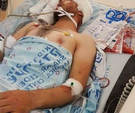
An Israeli settler driving in the southern occupied West Bank province of al-Khalil rammed his car into a Palestinian young man at daybreak Thursday, leaving him seriously wounded.
Reporting from al-Khalil, a PIC news correspondent said 23-year-old Hani al-Adarba was hit by an Israeli settler driving near Bypass Road 60, to the northeast of Halhul.
The settler fled the scene right away.
Israeli ambulances transferred the critically-injured youth to the Hadassah Hospital in Occupied Jerusalem.
The casualty’s family said his health condition has taken a turn for the worse after he was moved to al-Ahli Hospital in al-Khalil.
Reporting from al-Khalil, a PIC news correspondent said 23-year-old Hani al-Adarba was hit by an Israeli settler driving near Bypass Road 60, to the northeast of Halhul.
The settler fled the scene right away.
Israeli ambulances transferred the critically-injured youth to the Hadassah Hospital in Occupied Jerusalem.
The casualty’s family said his health condition has taken a turn for the worse after he was moved to al-Ahli Hospital in al-Khalil.
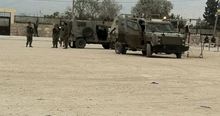
The Israeli occupation forces (IOF) on Wednesday cordoned off the archeological area of Sebastia town, northwest of Nablus in the West Bank, before scores of Jewish settlers swarmed the same area under military protection.
Sebastia mayor Mohamed Azzam said that Israeli soldiers were deployed around the archeological area to secure the presence of settlers who visited the site on allegations of performing rituals.
Azem noted that skirmishes took place between school students from the town and Israeli soldiers, who fired tear gas and stun grenades to disperse them.
He told Quds Press that the Israeli occupation regime persistently targets the archeological site of Sebastia and refuses to allow the Palestinian side to carry out renovations and repairs to the place at the pretext that it is located in an Israeli-controlled area.
The Israeli occupation authority is trying to take control of the archaeological area through increasing visits to the site by settlers and moving any sign that show it as a Palestinian area.
Sebastia mayor Mohamed Azzam said that Israeli soldiers were deployed around the archeological area to secure the presence of settlers who visited the site on allegations of performing rituals.
Azem noted that skirmishes took place between school students from the town and Israeli soldiers, who fired tear gas and stun grenades to disperse them.
He told Quds Press that the Israeli occupation regime persistently targets the archeological site of Sebastia and refuses to allow the Palestinian side to carry out renovations and repairs to the place at the pretext that it is located in an Israeli-controlled area.
The Israeli occupation authority is trying to take control of the archaeological area through increasing visits to the site by settlers and moving any sign that show it as a Palestinian area.
9 may 2018
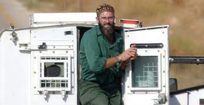
Yehoshua Elitzur, Jewish convert from Germany, was convicted in 2005 of killing Sael Jabara al-Shatiya, but fled the country before the sentencing; after being caught in Brazil and extradited to Israel, court finally sentences him.
Yehoshua Elitzur, who was convicted in September 2005 of killing a Palestinian and escaped to Brazil immediately afterwards, was sentenced Wednesday to 15 years in prison.
The Tel Aviv District Court also ordered Elitzur to pay his victim's family NIS 200,000 in compensation.
Elitzur, a Jewish convert from Germany living on a West Bank hilltop, was convicted of killing Sael Jabara al-Shatiya, a Palestinian from the village of Salem in the northern West Bank, in September 2004.
Elitzur was driving towards the settlement of Alon Moreh when he saw al-Shatiya heading in the opposite direction with several passengers.
Elitzur then stopped his car in the middle of the road to block al-Shatiya, before alighting his vehicle carrying a fully-loaded M-16 rifle.
Standing in the middle of the road, he instructed the van driver to stop. Due to the road conditions, the car could not stop, and al-Shatiya continued driving, turning right toward the shoulders of the road with the intention of stopping there.
Elitzur then shot at him once, and the bullet penetrated the car window and killed al-Shatiya.
Elitzur was convicted of manslaughter in September of 2005, but he fled the country before sentencing.
Interpol issued an international arrest warrant for Elitzur, who was tracked down by the efforts of the Israeli police's international division.
He was arrested in Sao Paulo in 2015 and after being cleared for extradition by the Brazilian Supreme Court, he was put on a plane to Israel in January 2018.
"The court determined that the defendant had shot at the deceased for no apparent reason, and ignored requests by the passengers to call for medical help. Even after the incident had ended, the defendant did not call for medical help," wrote Judge Zvi Gurfinkel wrote in his verdict.
The judge also noted the court had rejected Elitzur's claim that he was acting in self-defense, pointing out that "the vehicle did not turn in (Elitzur's) direction."
"In light of the unequivocal findings presented in the ruling, it is not reasonable to assume the defendant was in danger or mistakenly thought he was. We have before us a severe case of taking a human life without necessity or purpose," Gurfinkel elaborated.
"He (Elitzur) suspected anyone who isn't Jewish is a potential terrorist," the judge added.
Yasmin al-Shatiya, the Palestinian victim's blind daughter, welcomed the verdict. "I'm satisfied that my father's killer is going to prison for many years, for him to learn how precious life is," she said.
Elitzur, who was living in the settlement of Itamar at the time of the shooting, was apologetic but ultimately unrepentant. "I apologize to the family of the victim for the death of the father," he said at a past court hearing. "But I have no doubt my life was at risk. However, I do understand, from a humane point of view, that this is a great loss for the family. This is a very dangerous place and many things can happen there."
Yehoshua Elitzur, who was convicted in September 2005 of killing a Palestinian and escaped to Brazil immediately afterwards, was sentenced Wednesday to 15 years in prison.
The Tel Aviv District Court also ordered Elitzur to pay his victim's family NIS 200,000 in compensation.
Elitzur, a Jewish convert from Germany living on a West Bank hilltop, was convicted of killing Sael Jabara al-Shatiya, a Palestinian from the village of Salem in the northern West Bank, in September 2004.
Elitzur was driving towards the settlement of Alon Moreh when he saw al-Shatiya heading in the opposite direction with several passengers.
Elitzur then stopped his car in the middle of the road to block al-Shatiya, before alighting his vehicle carrying a fully-loaded M-16 rifle.
Standing in the middle of the road, he instructed the van driver to stop. Due to the road conditions, the car could not stop, and al-Shatiya continued driving, turning right toward the shoulders of the road with the intention of stopping there.
Elitzur then shot at him once, and the bullet penetrated the car window and killed al-Shatiya.
Elitzur was convicted of manslaughter in September of 2005, but he fled the country before sentencing.
Interpol issued an international arrest warrant for Elitzur, who was tracked down by the efforts of the Israeli police's international division.
He was arrested in Sao Paulo in 2015 and after being cleared for extradition by the Brazilian Supreme Court, he was put on a plane to Israel in January 2018.
"The court determined that the defendant had shot at the deceased for no apparent reason, and ignored requests by the passengers to call for medical help. Even after the incident had ended, the defendant did not call for medical help," wrote Judge Zvi Gurfinkel wrote in his verdict.
The judge also noted the court had rejected Elitzur's claim that he was acting in self-defense, pointing out that "the vehicle did not turn in (Elitzur's) direction."
"In light of the unequivocal findings presented in the ruling, it is not reasonable to assume the defendant was in danger or mistakenly thought he was. We have before us a severe case of taking a human life without necessity or purpose," Gurfinkel elaborated.
"He (Elitzur) suspected anyone who isn't Jewish is a potential terrorist," the judge added.
Yasmin al-Shatiya, the Palestinian victim's blind daughter, welcomed the verdict. "I'm satisfied that my father's killer is going to prison for many years, for him to learn how precious life is," she said.
Elitzur, who was living in the settlement of Itamar at the time of the shooting, was apologetic but ultimately unrepentant. "I apologize to the family of the victim for the death of the father," he said at a past court hearing. "But I have no doubt my life was at risk. However, I do understand, from a humane point of view, that this is a great loss for the family. This is a very dangerous place and many things can happen there."
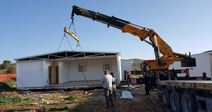
Israeli settlers on Wednesday erected mobile homes over Palestinian lands in al-Khader town south of Bethlehem for the establishment of a new settlement outpost.
Ahmad Salah, Coordinator of National Committee against Settlement in al-Khader, said that settlers built 22 caravans in Khallet Um Al-Fahem area in the town under protection of Israeli occupation forces.
Israeli forces alleged that the Palestinian land which area is estimated at 22 dunums are located within “Israeli state properties”.
Ahmad Salah, Coordinator of National Committee against Settlement in al-Khader, said that settlers built 22 caravans in Khallet Um Al-Fahem area in the town under protection of Israeli occupation forces.
Israeli forces alleged that the Palestinian land which area is estimated at 22 dunums are located within “Israeli state properties”.
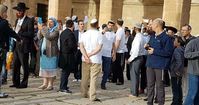
Israel’s alleged temple mount organizations have launched calls for stepping up sacrilegious break-ins at Jerusalem’s al-Aqsa Mosque—the third holiest site in Islam.
A hashtag reading “2,000 on the Jerusalem Day” has been launched by Israeli fanatics on the occasion of the so-called “reunification of Jerusalem”, referring to the day when Israel grabbed hold over the city following the notorious 1967 Six-Day War, which culminated in the displacement of thousands of Palestinians from their homes, in what is commonly referred to as the Nakba.
The Israeli organizations also distributed leaflets urging the Israeli masses to gradually intensify presence at al-Aqsa Mosque.
A hashtag reading “2,000 on the Jerusalem Day” has been launched by Israeli fanatics on the occasion of the so-called “reunification of Jerusalem”, referring to the day when Israel grabbed hold over the city following the notorious 1967 Six-Day War, which culminated in the displacement of thousands of Palestinians from their homes, in what is commonly referred to as the Nakba.
The Israeli organizations also distributed leaflets urging the Israeli masses to gradually intensify presence at al-Aqsa Mosque.

Israeli police on Wednesday morning allowed female settlers wearing Bat Mitsvah dresses to desecrate Jerusalem’s al-Aqsa Mosque—the third holiest site in Islam.
On Sunday Israel’s alleged temple mount organizations allowed an extremist Israeli girl wearing a Jewish wedding dress to storm al-Aqsa Mosque and perform sacrilegious rituals.
On July 29, 2015 Israeli police prevented extremist settlers from carrying out such rituals at al-Aqsa. One day later, Israel’s so-called Women for the Temple Organization rallied outside the Maghareba Gate to call for lifting the ban on such celebrations at al-Aqsa.
Reaching the age of bar or bat Mitzvah signifies becoming a full-fledged member of the Jewish community with the responsibilities that come with it. These include eligibility to be called to read from the Torah and lead or participate in a minyan; the right to possess personal property and to be married according to Jewish law.
On Sunday Israel’s alleged temple mount organizations allowed an extremist Israeli girl wearing a Jewish wedding dress to storm al-Aqsa Mosque and perform sacrilegious rituals.
On July 29, 2015 Israeli police prevented extremist settlers from carrying out such rituals at al-Aqsa. One day later, Israel’s so-called Women for the Temple Organization rallied outside the Maghareba Gate to call for lifting the ban on such celebrations at al-Aqsa.
Reaching the age of bar or bat Mitzvah signifies becoming a full-fledged member of the Jewish community with the responsibilities that come with it. These include eligibility to be called to read from the Torah and lead or participate in a minyan; the right to possess personal property and to be married according to Jewish law.
8 may 2018
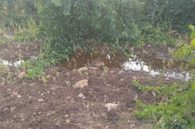
Israeli settlers, Tuesday, dumped wastewater into an agricultural land belonging to a Palestinian family in the town of Beit Ummar, to the north of the southern West Bank city of Hebron, said a local official.
Yousef Abu Maria, an anti-settlement activist in the town, told WAFA that settlers from the nearby illegal Israeli settlement of Gush Etzion dumped waste water into an agricultural land planted with grapes, to the north of the town, in an attempt to force the Palestinians to abandon their land as a prelude to seize it for the benefit of settlement expansion.
He maintained that, at this time of year, farmers in areas adjacent to the illegal settlements established to the north of Hebron suffer from settler violations and attacks against them, which inflicts heavy losses.
Yousef Abu Maria, an anti-settlement activist in the town, told WAFA that settlers from the nearby illegal Israeli settlement of Gush Etzion dumped waste water into an agricultural land planted with grapes, to the north of the town, in an attempt to force the Palestinians to abandon their land as a prelude to seize it for the benefit of settlement expansion.
He maintained that, at this time of year, farmers in areas adjacent to the illegal settlements established to the north of Hebron suffer from settler violations and attacks against them, which inflicts heavy losses.
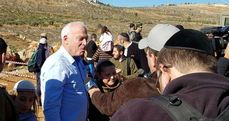
Dozens of Jewish settlers on Monday swarmed the Palestinian archeological site of Sebastia town, northwest of Nablus, under military protection.
Mayor of Sebastia Mohamed Azem said that an Israeli military force stormed the town, cordoned off the archeological area, and prevented local residents from approaching it before about 100 settlers entered the area and performed rituals at the site.
Azem noted that skirmishes took place between school students from the town and Israeli soldiers, who fired tear gas and stun grenades to disperse them.
He told Quds Press that the Israeli occupation regime persistently targets the archeological site of Sebastia and refuses to allow the Palestinian side to carry out renovations and repairs to the place at the pretext that it is located in an Israeli-controlled area.
Mayor of Sebastia Mohamed Azem said that an Israeli military force stormed the town, cordoned off the archeological area, and prevented local residents from approaching it before about 100 settlers entered the area and performed rituals at the site.
Azem noted that skirmishes took place between school students from the town and Israeli soldiers, who fired tear gas and stun grenades to disperse them.
He told Quds Press that the Israeli occupation regime persistently targets the archeological site of Sebastia and refuses to allow the Palestinian side to carry out renovations and repairs to the place at the pretext that it is located in an Israeli-controlled area.
